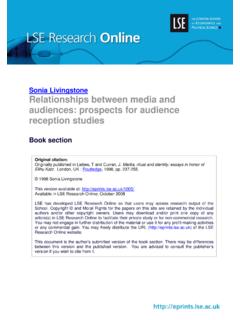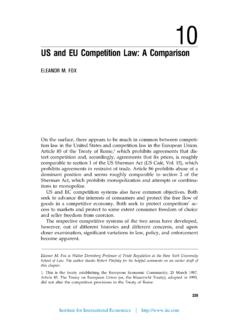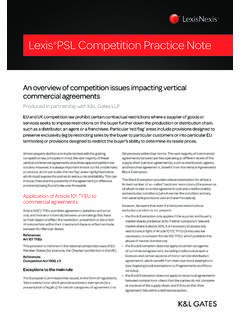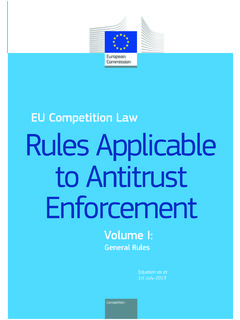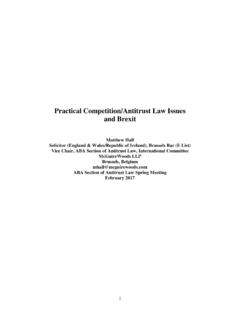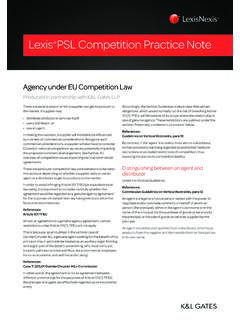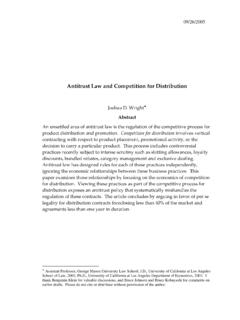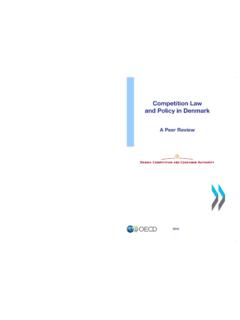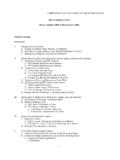Transcription of Revisiting Parental Liability in EU Competition Law
1 1 Revisiting Parental Liability in EU Competition Law Andriani Kalintiri* London School of Economics and Political Science Keywords: Parental Liability ; Competition law; single economic unit; decisive influence; failure to exercise vigilance; enterprise Abstract Why parent companies are held liable for the infringements committed by their subsidiaries under EU Competition law? This article examines the jurisprudence of the EU Courts with a view to illuminating the rationale underpinning Parental Liability . Taking a closer look at the single economic unit/undertaking explanation endorsed by the Courts post-Akzo, it demonstrates that this doctrine lacks the exegetical power assigned to it, insofar as it is based on a fallacious reasoning.
2 With this in mind, two alternative justifications for Parental Liability are then discussed: the failure to exercise vigilance theory and the enterprise rationale. As the article illustrates, both justifications have their advantages and limitations. Ultimately, the final choice lies with the EU Courts, but it is submitted that, all things considered, the failure to exercise vigilance argument offers a better or at least more realistic solution to the problem of developing a coherent explanation for Parental Liability in EU Competition law. Introduction Why parent companies are held liable for infringements committed by their subsidiaries under EU Competition law?
3 Simple as this question might be, the answer remains elusive, if not controversial. In brief, the problem may be synopsised as follows. European Union (EU) Competition law consists of two core rules in the Treaty on the Functioning of the European Union (TFEU):1 Article 101 TFEU, which forbids anticompetitive coordination; and Article 102 TFEU, which prohibits abuses of a dominant position in the market. Both provisions are addressed against undertakings . This term has been defined by the EU Courts as referring to an economic rather than a legal unit . Accordingly, an undertaking may consist of one or several legal persons as in the case of corporate groups, which are typically structured around parent companies and subsidiaries.
4 Fines, however, may only be imposed on entities with legal personality. Indeed, as the EU Courts have explained,2 although (..) an undertaking (..) is not necessarily the same as a company having a legal personality, it is necessary for the purposes of applying and enforcing decisions to identify an entity possessing legal personality to be the addressee of the measure .3 Therefore, when the European Commission adopts a decision pursuant to the Competition rules, it must identify the natural or legal person or persons who can be held responsible for the conduct of the relevant *Fellow, Law Department, London School of Economics and Political Science.
5 1 Consolidated Version of the Treaty on the Functioning of the European Union (TFEU) [2008] OJ C115/47. 2 References to the EU Courts should be understood as reference to the General Court of the European Union (General Court) and the Court of Justice of the European Union (ECJ). 3 Limburgse Vinyl Maatschappij and Others v Commission (T-305/94, T-306/94, T-307/94, T-313/94 to T-316/94, T-318/94, T-325/94, T-328/94, T-329/94 and T-335/94) ECLI:EU:T:1999:80, at [978]. 2 undertaking and can be penalized for that conduct .4 Where an undertaking encompasses a group of companies and the unlawful practice has been committed by a subsidiary, one would be excused to think that any Liability would burden the latter only.
6 Nevertheless, over the past decade the EU Courts have favoured a different approach to the attribution of Liability in these circumstances. According to now settled jurisprudence, where the parent company exercises decisive influence over the conduct of its subsidiary, the two entities constitute a single undertaking and may thus be held jointly and severally liable for the antitrust violation in question and the imposed fine. Such decisive influence is presumed to have been exercised in the case of wholly-owned subsidiaries, unless the parent company provides evidence that the subsidiary has decided independently upon its own conduct on the market . Unsurprisingly, corporate groups have not taken the rules on Parental Liability in stride.
7 In cartel cases in particular, parent companies have fiercely fought back by persistently challenging Commission decisions before the EU Courts. In a nutshell, most complaints revolve around three arguments: first, that the rules governing Parental Liability are incompatible with the principle that responsibility for a Competition violation is personal; second, that they pierce the corporate veil, thereby violating the principle of limited Liability of company shareholders; and third, that they contravene the principle of effective judicial protection, insofar as the presumption of decisive influence with respect to wholly-owned subsidiaries is practically impossible to rebut.
8 These criticisms, however, have been met with little sympathy by European judges, who have time and again dismissed them as unfounded. Indeed, the standard judicial response to all objections against Parental Liability over the past ten years has been twofold: first, that parent companies are held responsible for the antitrust violations of their subsidiaries because they form a single economic unit with them and thus the same undertaking; and second, that, albeit difficult to reverse, the presumption of decisive influence in the case of wholly-owned subsidiaries remains within acceptable limits and hence fair . Nevertheless, Parental Liability is not as straightforward as the EU Courts claim; on the contrary, it raises difficult questions of policy and law, which have not been adequately addressed.
9 The problem stems from the fact that, for all its apparent consistency, the case-law does not allow one to deduce a coherent theory for ascribing to parent companies responsibility for the antitrust transgressions of their subsidiaries. Indeed, despite the wealth of jurisprudence on the matter, the reason why parent companies are held liable remains unclear. Even worse, the EU Courts reluctance to engage with the criticisms raised by parent companies and their dry adherence to earlier judicial statements have had an unfortunate straightjacket effect, resulting in the creation of a convoluted web of precedents from which it is nearly impossible to escape.
10 Parental Liability , however, is not an issue to take lightly. On a doctrinal level, the question whether parent companies should be held responsible for the conduct of their subsidiaries has proved extremely contentious. On the one hand, the structuring of corporate groups around parent companies and subsidiaries is an intrinsic feature of the modern economy. On the other hand, legal fictions may sometimes result in objectionable outcomes, insofar as they may enable corporate groups to shield themselves from Liability by externalising the risks of their These issues become even more complicated in the context of Competition enforcement.
